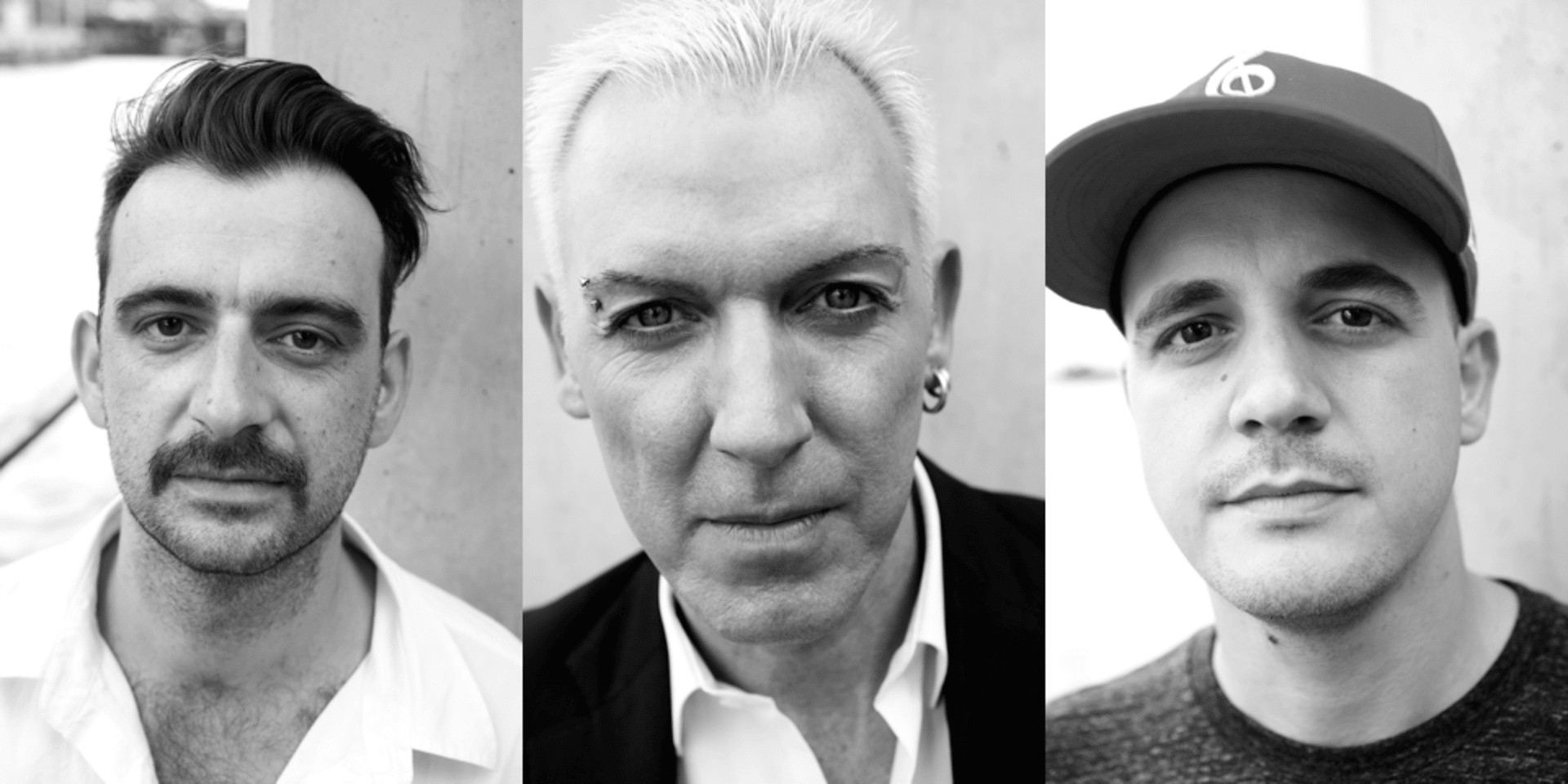
H.P. Baxxter meets Modeselektor Part 2 – “Every audience loves pyro”
Modeselektor’s Sebastian Szary narrowly escaped death recently after dancing on top of what he thought was a spotlight during a performance in Austria. It turned out to be a massive flamethrower. Read Part 1 “It’s the haircut, I guess.”
Sebastian Szary: How big is your entourage?
H.P. Baxxter: There’s the three of us in the band, then there are some technicians and, of course, our office. Last but not least we have two girl dancers from England and two professional jumpers from Holland on stage.
Gernot Bronsert: Jumpers?
HP: Yes, the jumpers have been around since we released our album Jumping All Over the World in 2007. Jumpstyle is still a very popular dance style. Ah, I almost forgot: we travel with a pyrotechnician.
SS: You travel with your own fire department too?
HP: No, every venue handles that separately.
GB: Last weekend we had a scary incident in Austria in a former tank storage facility of the Austrian army. During our set, Szary climbed on a flamethrower thinking it was a laser spotlight and used it as a pedestal. When he jumped back on stage, it spit out a massive, larger-than-life flame right where he’d been standing.
SS: I could’ve gotten grilled.
HP:But it’s still fun, isn’t it? It’s the same kind of fun we had when we bought firecrackers as kids. Every audience loves pyro. We immediately sense a difference in the crowd in countries in which pyrotechnics are forbidden—like in Russia, for example.
GB: What do you use instead? Confetti?
HP: Serious amounts of fog. But it’s far less impressive. And you can’t blame the audience for not reacting as intensely—I feel the same! I’m so used to things being fired off in certain key moments of our shows that I end up really, really missing them. The feeling of loss is like phantom pain.
SS: You’ve never had a bad experience with pyrotechnics?
HP: Once a very expensive coat of mine went up in flames because my assistant had put it near a flamethrower. But we’ve learned from that experience. It never happened again and not a single person has ever been injured during one of our shows.
GB: We should enhance our stage shows with pyrotechnics. I am dead serious about that, Szary.
SS: If I should miss a meeting in the next weeks, it’s probably because I’m busy training to become a pyrotechnician. The apprenticeship might even be subsidized by the government.
HP: You mean you want to become professional like Till Lindemann from Rammstein? As far as I know, they even design and build their pyro- technical devices themselves.
GB: I remember that we once wanted to pimp up our DJ console with some strobe lights, but our equipment rental guys at Blackbox said Rammstein had already reserved all available gear for the next four months. Every single light. And I’m talking about, like, two hundred of these things!
SS: I don’t want to know Rammstein’s electricity bill.
HP: I heard that Rammstein came out of Schwerin’s theater scene in the eighties—before the fall of the Iron Curtain. They worked as light and stage technicians, which would explain why their approach to concerts is so theatrical. Speaking for myself, I always liked the bands that had an enormous stage presence more. When I was still listening to hard rock around twelve or thirteen, I liked Ritchie Blackmore because he always destroyed his guitar during his sets. Already then I knew it wasn’t spontaneous, that it was rehearsed. But it didn’t diminish the excitement I felt watching the destruction. Looking back, the fireworks we used at our first live shows were child’s play compared to the amount of kaboom we set off nowadays. At a certain point in our career we spent more money on pyrotechnics than we made on ticket sales. But back in the day we also used to earn incredible amounts of money with CD sales, and we used the concerts to increase it. This obviously has reversed one hundred and eighty degrees since then.
GB: When exactly were these golden days?
HP: In the mid-nineties we would go gold or platinum with every single that we’d release, whereas the whole album would only sell OK. Then a couple of years later, our albums also started selling really well. And this went on for a decade. So when did Modeselektor form?
GB: Szary and I started in 1996 in his father’s garage. Among our gear was a Roland Space Echo analog delay. One of the knobs was labeled “Mode Selector”. We combined the two words and changed the “c” to a “k” to make it all look more German.
HP: That’s funny—I also own this device, but I never used that button.
SS: We used this effect intensely.
GB: It was the only effect we had, to be honest. But looking back, it really helped shape our sound.
HP: I bought my Space Echo in the early eighties when I became the singer for a band called Celebrate the Nun. I liked the effect on the voices of Nik Fiend, Marc Almond and Dave Gahan, and they all used the Space Echo, so I bought one too.
GB: I’ve never heard any music by Celebrate the Nun.
HP: The special thing about this band was that we very seriously tried to become famous, but we never succeeded. We did it for eight years and literally nothing happened.
GB: I read that your sister was in the band, too? That’s interesting.
HP: It was interesting, but a bit odd—especially when this director proposed that we should act like lovers in one of our videos. But what can I say? Every experience you make in life is a good experience somehow.
Continued in Part 3 “The hate wears off” .
–
Published December 15, 2012. Words by Max Dax.
